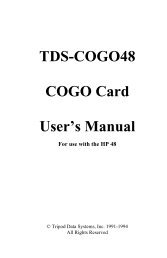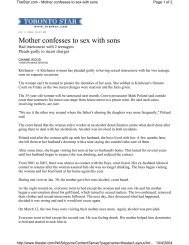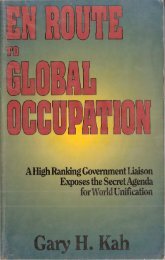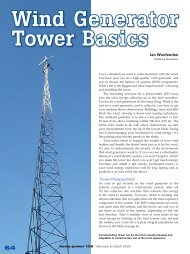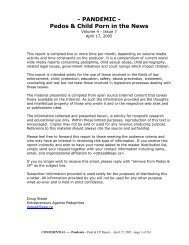G. Edward Griffin - The Fearful Master - PDF Archive
G. Edward Griffin - The Fearful Master - PDF Archive
G. Edward Griffin - The Fearful Master - PDF Archive
You also want an ePaper? Increase the reach of your titles
YUMPU automatically turns print PDFs into web optimized ePapers that Google loves.
When I moved that the draft constitution of the Burma Union should be<br />
approved by the Constituent Assembly, I stated clearly that Burma was<br />
to be a leftist country. . . . In such a leftist country, the production of<br />
commodities is not for the purpose of profit. . . . Briefly, leftism is the<br />
policy by which the world is being turned from the wrong path to the<br />
right path. . . . Lenin and Stalin, when building up Russia, did not use<br />
everything which the found in the writings of Karl Marx. <strong>The</strong>y adopted<br />
what was suitable for Russia. In [Red] China also leftist leaders adopted<br />
what was suitable for that country. Not very long ago when my friend Ko<br />
Ohn went to (Communist] Poland, he was advised by Polish leftists<br />
thus: "We don't go wrong because others go wrong. We do what is<br />
suitable for Poland and we advise Burma to do what is suitable for<br />
Burma."<br />
See what Stalin did to build up Russia's own strength. In 1939, in order<br />
to bring additional strength to Russia, he entered into a non-aggression<br />
treaty even with Hitler. . . . When Trotsky was trying to bring about a<br />
world revolution, he accused Stalin and his followers, who were<br />
endeavoring to strengthen Russia, of being traitors to the revolution. . . .<br />
If we now look back to history, we find that Stalin followed the right<br />
path. 19<br />
U Nu then went on to advocate the following program. Strengthen ties with Soviet Russia;<br />
confiscate all capitalist enterprises in Burma; abolish private ownership of land; form a<br />
league for the propagation of Marxist doctrine; and create a peoples democratic army.<br />
Knowing what kind of political views were held by U Nu, we are now better able to<br />
appreciate the full impact of the following rather innocuous news item that appeared in the<br />
November 16, 1961, issue of the Burma Weekly Bulletin:<br />
Before Burma became independent soon after the Second World War,<br />
U Thant entered the political field upon call by General Aung San and U<br />
Nu. On September 1, 1947, he was made deputy director (press),<br />
information department. As a public servant, U Thant earned reputation<br />
and rapid promotion because of his ability, hard work, simpleness and<br />
good nature. U Thant was promoted as secretary in the same ministry<br />
before becoming the prime minister's secretary on January 1954. In the<br />
year 1952, U Thant went to the seventh session of the U General<br />
Assembly as a member of the Burmese delegation. Since then, he has<br />
traveled widely and generally in the company of Prime Minister U Nu as<br />
a trusted advisor and friend. 20 [Italics added.]<br />
In March of 1962 U Nu was ousted by General Ne Win. This was hardly an anti-<br />
Communist or anti-socialist coup. <strong>The</strong> new Government merely speeded up the machinery<br />
which U Nu had set in motion. All commercial banks were taken over by the state, all<br />
private industry was declared illegal, and the entire economy was put under "total state<br />
control." 21<br />
After Thant was elected Secretary-General he immediately began to exercise his special<br />
brand of Burmese impartiality. One has almost grown accustomed to the kind of headlines<br />
which appeared on the front page of the Chicago Tribune on December 3, 1962: "Thant<br />
Asks U.S. To Meet Reds at UN: Chides West and Lauds Nikita." 22 Thant blasted the


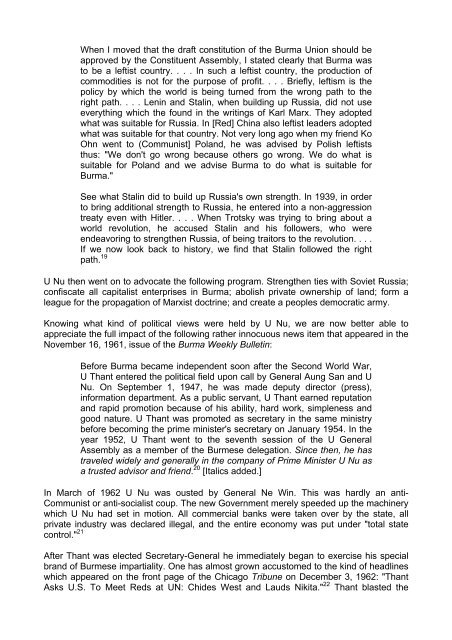
![Robert T McQuaid [rtmq@stn.net] Sent: Friday, October 29, 2004 12 ...](https://img.yumpu.com/51070071/1/190x245/robert-t-mcquaid-rtmqstnnet-sent-friday-october-29-2004-12-.jpg?quality=85)

